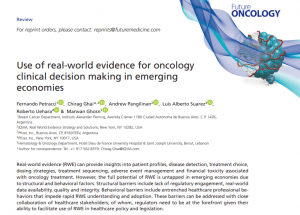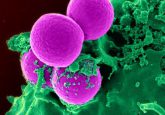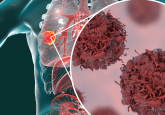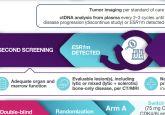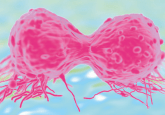Use of real-world evidence for oncology clinical decision making in emerging economies

This review, which has been recently published in our partner journal Future Oncology, identifies the benefits and major barriers associated with use of real-world evidence (RWE) for oncology clinical decision making in emerging economies. Furthermore, the authors of this review provide a call to action that includes pragmatic solutions that may address the underlying barriers that prevent further RWE adoption in emerging economies. The findings and recommendations provided within this review are based on oncology expert experience and research pertaining to RWE oncology studies conducted in emerging economies.
Abstract:
RWE can provide insights into patient profiles, disease detection, treatment choice, dosing strategies, treatment sequencing, adverse event management and financial toxicity associated with oncology treatment. However, the full potential of RWE is untapped in emerging economies due to structural and behavioral factors. Structural barriers include lack of regulatory engagement, real-world data (RWD) availability, and quality and integrity. Behavioral barriers include entrenched healthcare professional behaviors that impede rapid RWE understanding and adoption. These barriers can be addressed with close collaboration of healthcare stakeholders; of whom, regulators need to be at the forefront given their ability to facilitate use of RWE in healthcare policy and legislation.
Lay Summary:
Traditionally, randomized clinical trials have been used to provide insights on new medical therapies and continue to remain the gold standard for approval. With the increasing availability of patient-level data in the real-world, it is now possible to generate evidence regarding the usage and potential benefits or risks of a medical therapy derived from analysis of RWD. This evidence is collectively referred to RWE. Randomized clinical trials and RWE are complementary, and the area of oncology especially benefits from RWE to guide clinical decision making across the patient journey. Key benefits include cancer screening and diagnosis, optimal treatment choices (including personalized medicine) and disease management such as dosing and treatment of side effects. In recent times, RWE generation in oncology has been prolific in the United States and Western Europe. With expansive biopharmaceutical investments into infrastructure harnessing patient-level data and greater local regulatory guidance, oncology patients in emerging economies may now also have the opportunity to benefit from clinical decision making informed by RWE.
Read the full paper titled ‘Use of real-world evidence for oncology clinical decision making in emerging economies‘ here:
